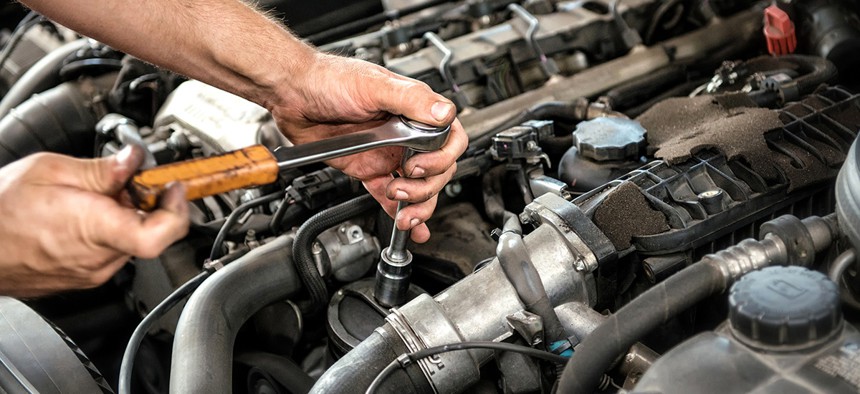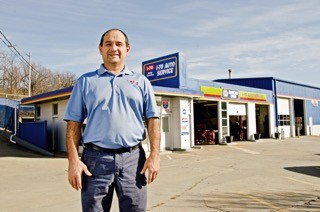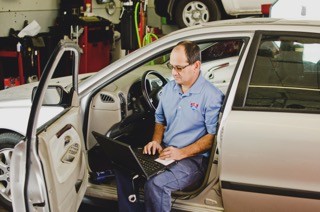A Mechanic Faces the Age of the Self-Driving Car

Photology1971/Shutterstock.com
Joe Sevart, an auto technician turned business owner in Kansas City, Missouri, talks about the future of servicing more advanced vehicles.
The Model T automobile, produced by Ford Motor company in 1908, cost just $850 at the time. While it wasn’t the first automobile on the market, it was the most affordable option for many Americans, which in turn put more drivers on the road.
With the arrival of those cars came a need for a new kind of worker: people who could fix automobiles. It was a job that could provide a decent income and didn’t require a college degree. Automobile technology has advanced measurably since those days, so much so that tech giants such as Google, Tesla, and Uber are fighting to get Americans out of the driver’s seat by way of self-driving cars. In turn, efforts to make cars safer, more autonomous, and more energy-efficient have created a shortage of technicians with the skills to work on the technologically advanced vehicles.
Joe Sevart owns an auto-service business in Kansas City, Missouri, that specializes in computer diagnostics. I spoke with Sevart about his transition from technician to business owner, why he hired a business coach, and how electric and driverless cars are changing the traditional auto industry. The interview that follows has been lightly edited for length and clarity.
Adrienne Green: What inspired you to become an auto technician?

Kansas City, Missouri (1-70 Auto Service)
Joe Sevart: Today, I am the president of I-70 Auto Service in Kansas City, which is a business my father opened. We've been in business for 40 years, and I've been a part of it for 37 years. I started working here when I was 14 years old, and I’ve only stepped away from it for three years after graduating high school. My dad asked me to come back and help him run the business in 1983, and I have been running it ever since.
Green: What kind of work did you do as a 14-year-old in your dad’s shop?
Sevart: I was in school, so my dad would bring me down on the weekends. At that point, we were a full-service gas station, so I pumped the gas and checked people's oil, transmission fluid, and tires. I would do all of this out on the drive no matter what the weather was like—raining, snowing, zero degrees, or 100 degrees. When I got old enough to drive, my father bought me a car and said, “This car is for you to get to and from work when you're out of school.” School ended at 2:20 p.m., and I would drive down to Kansas City to work from 3 p.m. until the shop closed at 7 p.m. Then I went home to do homework, and did the same thing the next day.
Green: What was it like to transition from being a technician to a business-owner?
Sevart: Before, I did a lot of car maintenance, and then got an education on how to actually fix cars. I became a pretty good technician, and worked on a lot of electrical stuff and diagnostics. I prided myself on fixing vehicles that other shops couldn't fix.
In 2010, I hired a business coach, which was the smartest move I ever made. My business coach told me that I needed to decide if I wanted to work on the business or in the business. So I started hiring better staff, and I walked away from working on cars to start managing processes, procedures, and marketing. Today, I very seldom ever actually go out and work on a car. It'd have to be something that my staff is having difficulties with and seeking my guidance. My passion is fixing cars, but I had to learn to run a profitable business and do it the correct way.
Green: How'd you come to the decision to get the business coach?
Sevart: Many people that start family-owned shops have no formal training, or they're a good technician who doesn’t know how to run a business. I was ashamed, because I was a business owner, but I really didn't know numbers. I would get stuff from the accountant, and I would just file it without looking at it. All I wanted to do was fix cars. At my first meeting with my coach, they talked about things that I didn't understand because I didn't have a business degree. I just knew how to fix cars, and I never even went to school for that.
Green: What is an average day like for you?
Sevart: When I was a technician, I would come in and pick the job that I wanted since I owned the place. I was thinking about nothing except fixing that car. Today, as a business owner, most mornings I come in and greet my staff, and audit our invoices from the previous day to check efficiencies and productivity. My technicians clock in and out of jobs, so I check daily to see if we have a bottleneck: Is our parts supplier not getting us parts fast enough? Or is our service advisor not getting the jobs bid quick enough?
I actually took over some tasks from my accountant. I still have one, but I pay all the bills, and I do the entire payroll. I just want to keep a close eye on my expenses and any mistakes. If we were to make a mistake in invoicing, or while purchasing a part, and maybe just even put down the wrong vendor, my accountant's not going to know that. But I can catch those things.
Sevart: Now, all of my technicians work off of iPads and laptops and we're in the process of going paperless. We're trying to limit verbal communication because that knocks down on efficiency and productivity. The guys don't have to walk back and forth across the shop, so we use our iPads and Google Hangout chats. All of our customers' repair orders are sent over the internet: We take pictures of everything, we can send you a detailed text or email, and also send you a video. You can be at your office right now, and maybe we don't even have to talk to you.
I don't know if there's an industry that changes as rapidly as the automotive industry. Here we are, with the autonomous car; we’ve got cars that are out on the roads driving themselves with cameras in the back of the vehicles to make sure that we don't hit something backing up. We've got cars that are applying the brakes, because the human brain's not functioning quite fast enough. We have to adapt and change, and we've got to be educated. I spend thousands and thousands of dollars a year on training, because it changes so much.
There are also cars nowadays that are full electric, so we're having to offer training on a vehicle that doesn't run off gasoline anymore. The industry is something that we need to get more young men and women involved in, because it's not the same occupation that I grew up in, where you were known as a mechanic or a grease monkey. Now, you're just sitting in a car's seat with a laptop figuring out what's wrong with these cars.

Green: How does that evolution make you feel?
Sevart: I'm nervous about the autonomous car. It scares me, because my wife, my children, my grandchildren are out on the road. It's kind of nice to have that backup human being who can make a last-minute decision. Things happen with human beings driving cars, and now we've got a computer taking over. In the next few years, you're going to look over and see a car driving with nobody in it, or a car driving passengers with no one actually driving the car.
Green: Are you worried about how those technological changes will affect your job?
Sevart: We do a lot of software programming to cars today, and we might lose some of that when they can do it online. If you're driving down the road and Chevrolet says, "Hello. This is Chevrolet, and we see that there's an update for your vehicle, and we're going to update it as you're driving," and you respond back and it’s done. That's kind of where it's going, and we're already there to an extent.
But, cars are still going to have to be fixed. You've still got brakes and steering. There are still [physical] things that are going to have to be done that you can't fix by pressing a button via the internet. Is it going to take some of our business away? Yeah, but I think it's going to take a long time. Maybe in 15 years, it could start being more of an impact. But you’ll still have to build relationships with your customers, because they're still going to need an oil change or coolant. The maintenance is still going to be there.
Green: You mentioned earlier the perception of technicians and mechanics as grease monkeys. Do you think that the advancement of technology is going to change that image?
Sevart: We're really hoping so. We are trying to tell the teachers at the junior-high levels that this industry has changed. When I grew up, they took all the people that didn't want to go to college, and they said, "Hey, this is a good industry. You're good with your hands. You might not be college material," and they pushed them into this industry. Now, it's changing because we're using laptops and high-tech, expensive equipment. There's going to be a day where we're going to have to have a computer programmer work for us. Even nowadays, you can sit here and not get your hands very dirty in this occupation.
NEXT STORY: Video: Energy Department's 3-D Printed House





